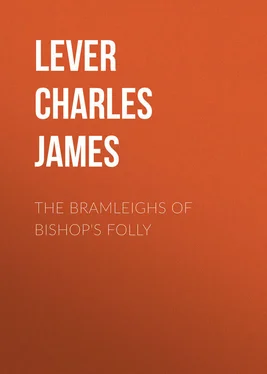Charles Lever - The Bramleighs of Bishop's Folly
Здесь есть возможность читать онлайн «Charles Lever - The Bramleighs of Bishop's Folly» — ознакомительный отрывок электронной книги совершенно бесплатно, а после прочтения отрывка купить полную версию. В некоторых случаях можно слушать аудио, скачать через торрент в формате fb2 и присутствует краткое содержание. Издательство: Иностранный паблик, Жанр: literature_19, foreign_antique, foreign_prose, на английском языке. Описание произведения, (предисловие) а так же отзывы посетителей доступны на портале библиотеки ЛибКат.
- Название:The Bramleighs of Bishop's Folly
- Автор:
- Издательство:Иностранный паблик
- Жанр:
- Год:неизвестен
- ISBN:нет данных
- Рейтинг книги:4 / 5. Голосов: 1
-
Избранное:Добавить в избранное
- Отзывы:
-
Ваша оценка:
- 80
- 1
- 2
- 3
- 4
- 5
The Bramleighs of Bishop's Folly: краткое содержание, описание и аннотация
Предлагаем к чтению аннотацию, описание, краткое содержание или предисловие (зависит от того, что написал сам автор книги «The Bramleighs of Bishop's Folly»). Если вы не нашли необходимую информацию о книге — напишите в комментариях, мы постараемся отыскать её.
The Bramleighs of Bishop's Folly — читать онлайн ознакомительный отрывок
Ниже представлен текст книги, разбитый по страницам. Система сохранения места последней прочитанной страницы, позволяет с удобством читать онлайн бесплатно книгу «The Bramleighs of Bishop's Folly», без необходимости каждый раз заново искать на чём Вы остановились. Поставьте закладку, и сможете в любой момент перейти на страницу, на которой закончили чтение.
Интервал:
Закладка:
“I think not,” said L’Estrange; “he seemed to me more stunned than actually injured. Fortunately for him they had not far to take him, for the disaster occurred quite close to Duckett’s Wood, where he is stopping.”
“Is he at Longworth’s?” asked Augustus.
“Yes. Longworth met him up the Nile, and they travelled together for some months, and, when they parted, it was agreed they were to meet here at Christmas; and though Longworth had written to apprise his people they were coming, he has not appeared himself, and the Frenchman is waiting patiently for his host’s arrival.”
“And laming his best horse in the mean while. That dark bay will never do another day with hounds,” said Temple.
“She was shaky before, but she is certainly not the better of this day’s work. I ‘d blister her, and turn her out for a full year,” said Augustus.
“I suppose that’s another of those things in which the French are our superiors,” muttered Jack; “but I suspect I ‘d think twice about it before I ‘d install myself in a man’s house, and ride his horses in his absence.”
“It was the host’s duty to be there to receive him,” said Temple, who was always on the watch to make the sailor feel how little he knew of society and its ways.
“I hope when you’ve finished your wine,” said Ellen, “you’ll not steal off to bed, as you did the other night, without ever appearing in the drawing-room.”
“L’Estrange shall go, at all events,” cried Augustus. “The Church shall represent the laity.”
“I ‘m not in trim to enter a drawing-room, Miss Bramleigh,” said the curate, blushing. “I would n’t dare to present myself in such a costume.”
“I declare,” said Jack, “I think it becomes you better than your Sunday rig; don’t you, Nelly?”
“Papa will be greatly disappointed, Mr. L’Estrange, if he should not see you,” said she, rising to leave the room; “he wants to hear all about your day’s sport, and especially about that poor Frenchman. Do you know his name?”
“Yes, here’s his card; – Anatole de Pracontal.”
“A good name,” said Temple, “but the fellow himself looks a snob.”
“I call that very hard,” said Jack, “to say what any fellow looks like when he is covered with slush and dirt, his hat smashed, and his mouth full of mud.”
“Don’t forget that we expect to see you,” said Ellen, with a nod and a smile to the curate, and left the room.
“And who or what is Mr. Longworth?” said Temple.
“I never met him. All I know is, that he owns that very ugly red-brick house, with the three gables in front, on the hill-side as you go towards Newry,” said Augustus.
“I think I can tell you something about him,” said the parson; “his father was my grandfather’s agent. I believe he began as his steward, when we had property in this county; he must have been a shrewd sort of man, for he raised himself from a very humble origin to become a small estated proprietor and justice of the peace; and when he died, about four years ago, he left Philip Longworth something like a thousand a year in landed property, and some ready money besides.”
“And this Longworth, as you call him, – what is he like?”
“A good sort of fellow, who would be better if he was not possessed by a craving ambition to know fine people, and move in their society. Not being able to attain the place he aspires to in his own county, he has gone abroad, and affects to have a horror of English life and ways, the real grievance being his own personal inability to meet acceptance in a certain set. This is what I hear of him; my own knowledge is very slight. I have ever found him well-mannered and polite, and, except a slight sign of condescension, I should say pleasant.”
“I take it,” said the sailor, “he must be an arrant snob.”
“Not necessarily, Jack,” said Temple. “There is nothing ignoble in a man’s desire to live with the best people, if he do nothing mean to reach that goal.”
“Whom do you call the best people, Temple?” asked the other.
“By the best people, I mean the first in rank and station. I am not speaking of their moral excellence, but of their social superiority, and of that pre-eminence which comes of an indisputable position, high name, fortune, and the world’s regards. These I call the best people to live with.”
“And I do not,” said Jack, rising, and throwing his napkin on the table, “not at least for men like myself. I want to associate with my equals. I want to mix with men who cannot overbear me by any accident of their wealth or title.”
“Jack should never have gone into the navy, that ‘s clear,” said Augustus, laughing; “but let us draw round the fire and have a cigar.”
“You’ll have to pay your visit to the drawing-room, L’Estrange,” said Jack, “before we begin to smoke, for the governor hates tobacco, and detects it in an instant.”
“I declare,” said the parson, as he looked at his splashed cords and dirty boots, “I have no courage to present myself in such a trim as this.”
“Report yourself and come back at once,” cried Jack.
“I ‘d say, don’t go in at all,” said Temple.
“That’s what I should do, certainly,” said Augustus.
“Sit down here. What are you drinking? This is Pomare, and better than claret of a cold evening.”
And the curate yielded to the soft persuasion, and, seated around the fire, the young men talked horses, dogs, and field sports, till the butler came to say that tea was served in the drawing-room, when, rising, they declared themselves too tired to stay up longer, and wishing each other good night they sauntered up to their rooms to bed.
CHAPTER IV. ON THE CROQUET LAWN
The day after a hard run, like the day after a battle, is often spent in endeavors to repair the disasters of the struggle. So was it here. The young men passed the morning in the stables, or going back and forward with bandages and liniments. There was a tendon to be cared for, a sore back to be attended to. Benbo, too, would n’t feed; the groom said he had got a surfeit; which malady, in stable parlance, applies to excess of work, as well as excess of diet.
Augustus Bramleigh was, as becomes an eldest son, grandly imperious and dictatorial, and looked at his poor discomfited beast, as he stood with hanging head and heaving flanks, as though to say it was a disgraceful thing for an animal that had the honor to carry him to look so craven and disheartened. Temple, with the instincts of his craft and calling, cared little for the past, and took but small interest in the horse that was not likely to be soon of use to him; while Jack, with all a sailor’s energy, worked away manfully, and assisted the grooms in every way he could. It was at the end of a very active morning, that Jack was returning to the house, when he saw L’Estrange’s pony-chaise at the door, with black Nora in the shafts, as fresh and hearty to all seeming as though she had not carried her heavy owner through one of the stiffest runs of the season only the day before.
“Is your master here, Bill?” asked Jack of the small urchin, who barely reached the bar of the bit.
“No, sir; it’s Miss Julia has druv over. Master ‘s fishing this morning.”
Now Julia L’Estrange was a very pretty girl, and with a captivation of manner which to the young sailor was irresistible. She had been brought up in France, and imbibed that peculiar quiet coquetry which, in its quaint demureness, suggests just enough doubt of its sincerity to be provocative. She was dark enough to be a Spaniard from the south of Spain, and her long black eyelashes were darker even than her eyes. In her walk and her gesture there was that also which reminded one of Spain: the same blended litheness and dignity; and there was a firmness in her tread which took nothing from its elasticity.
Читать дальшеИнтервал:
Закладка:
Похожие книги на «The Bramleighs of Bishop's Folly»
Представляем Вашему вниманию похожие книги на «The Bramleighs of Bishop's Folly» списком для выбора. Мы отобрали схожую по названию и смыслу литературу в надежде предоставить читателям больше вариантов отыскать новые, интересные, ещё непрочитанные произведения.
Обсуждение, отзывы о книге «The Bramleighs of Bishop's Folly» и просто собственные мнения читателей. Оставьте ваши комментарии, напишите, что Вы думаете о произведении, его смысле или главных героях. Укажите что конкретно понравилось, а что нет, и почему Вы так считаете.












